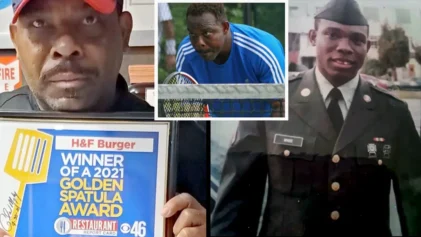A union, co-workers and friends of the mother of three fatally killed on New Year’s Eve are trying to cope with her terrifying on-the-job death.
Courtney Edwards, 34, was working as a ground handling agent for Piedmont Airlines, a subsidiary of American Airlines, on Saturday, Dec. 31, when she was sucked into a plane’s engine.

According to the National Transportation Safety Board, around 3 p.m. Edwards was walking toward a parked Embraer E175 American Airlines plane before she was “ingested into the engine.”
Many wondered how could this happen to the worker.
“This is most unfortunate, and the first case I’ve heard of where a civilian was ingested by an A/C engine,” wrote John McKnight, a contributor to an online campaign for Edwards. “It happens in the military. But it is unfortunate for anyone who is pulled into an engine even if they survive it. My condolences and prayers go out to her family.”
Popular Mechanic said, “Injury or death from jet engine ingestion is uncommon, it isn’t unprecedented.”
The trade publication cited a study by Boeing, an American company that designs, manufactures, and sells airplanes, which said over the span of approximately 40 years, there were 33 reports of ingestions (with one of those causing death) by Boeing 737 model 100 and 200 airplanes.
The company further stated in the 737 models 300, 400, 500, and Next Generation airplanes there were four fatal ingestion incidents during those four decades.
“When a jet engine operates, it creates a low air pressure area in the inlet. This low-pressure area causes a large quantity of air form the area forward of the inlet cowl to go into the engine,” The expert explained. “The air that is near the inlet cowl moves at a much higher velocity than air that is farther from the inlet. As a result, the amount of engine suction is small until ones nears the inlet, where the suction increases significantly.”
An investigation into the tragic accident is underway, and the CWA staff, leadership, and president will join with the airline and the Montgomery Regional Airport (MGM). The Federal Aviation Administration is also investigating the jet engine ingestion accident and hopes a report within a few weeks.
MGM executive director Wade A. Davis said in a statement on the day of her demise, “We are saddened to hear about the tragic loss of a team member of the AA/Piedmont Airlines.”
Richard Honeycutt, Vice President of CWA District 3 and Chair of CWA’s Passenger Service Airline Council, released remarks via the Union’s website on Thursday, Jan. 5, calling her death a “terrible tragedy.”
“Courtney was a valued member of her team and our union. She was away from her family working on New Year’s Eve making sure passengers got to where they needed to be for the holidays,” Honeycutt said. “She represents the very best of our CWA airport members, who constantly make sacrifices to serve the flying public.”
The executive said, “her memory will live on in the hearts and minds of her fellow CWA members and those closest to her.”
On Wednesday, Jan. 4, Donielle Prophete, the President of the CWA (Communication Workers of America) Local 3645, set up a GoFundMe page in honor of Edwards.
As the group celebrates her life, they are also stepping up to provide monetary assistance for her funeral.
The crowdfunding campaign was set up to “help cover funeral expenses, day-to-day expenses, and any other expenses needed to care for the children,” and the funds raised will be managed by Edwards’ mother, Natalie English.
Within two days, the fundraiser almost doubled its goal of $25,000.
Many chimed in about how sad her passing was and reflected on who she was.
“I’m so sorry that this happened and pray that Courtney’s life will prompt changes that prevent something like this from ever happening again and similar heartache to another family,” Darryl Daniels wrote on the page.
Divonta Palmer, a former co-worker of Edwards, said to WSFA that he is crushed by her death, saying, “I can’t wrap my mind around how this happened.”
He also added, “She would tell me that she was always dedicated and motivated to do the best job and put the best foot forward.”
Palmer raised an issue about the mental wellness of those who may have witnessed the accident. He said many of them may be “scarred” by the tragedy, adding the accident should be a “wake-up call” for those who work on the grounds and closely with the actual planes to focus on safety.


